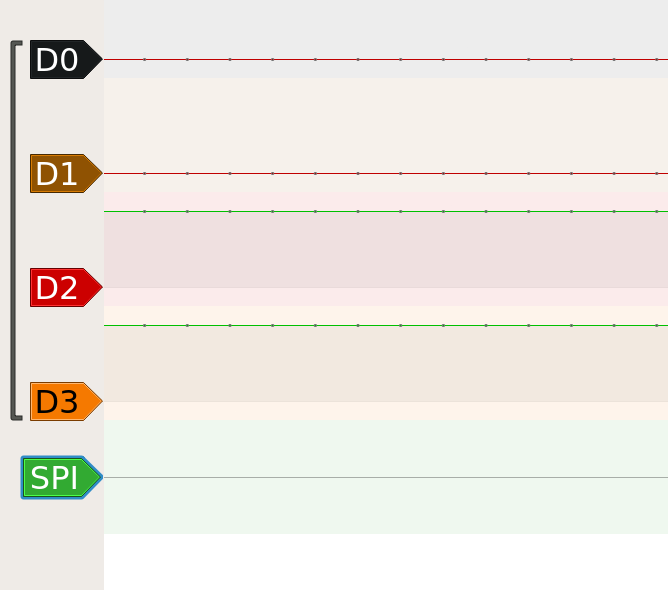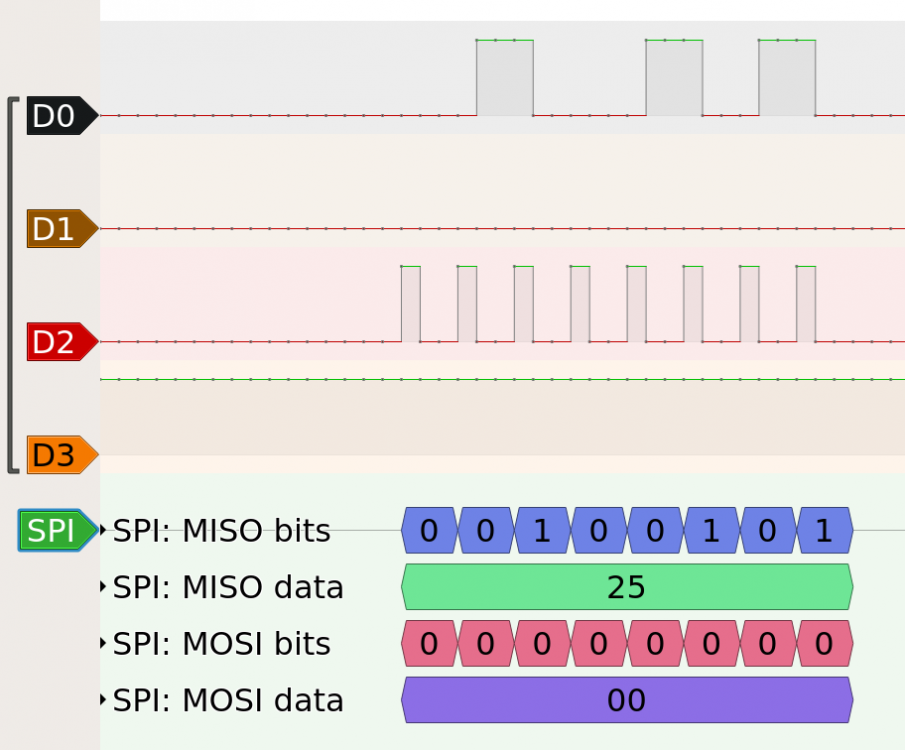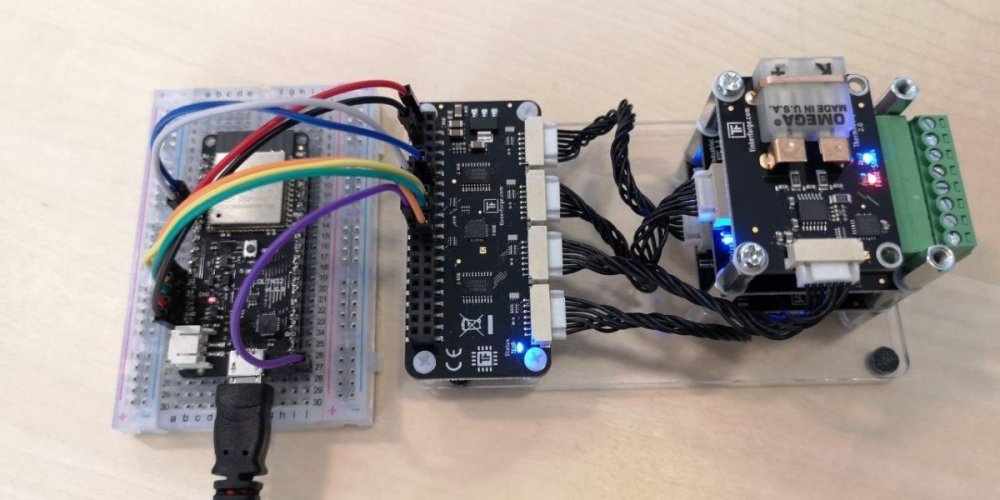
stif
-
Gesamte Inhalte
14 -
Benutzer seit
-
Letzter Besuch
Posts erstellt von stif
-
-
Hallo Liebes TF Team,
mir ist gerade aufgefallen, dass Bricklet Industrial_Dual_AC_Relais fehlt auch im C++ Binding für Mikrocontroller..
-
Hallo,
Ich habe mich in den letzten Tagen mit dem C++ Binding auseinandergesetzt (siehe dieser Thread bzw dieses Github Repository)
Die Version im Repository funktioniert ganz ordentlich mit einem ESP32, doch wenn ich eine Display & Touchscreen Library über einen separaten SPI Bus einbinde (unabhängige GPIO Pins) sinkt der Loop Aufruf von ~38000x auf ~40x pro Sekunde.
Dadurch sind die Temperatur Werte um mehr als 10 Sekunden verzögert und das Programm generell etwas laggy und somit für einen PID Regler unbrauchbar.
Vermutlich liegt es an dieser Vorgehensweise:
Am 3.8.2020 um 12:12 schrieb rtrbt:Das funktioniert im Bricklet folgendermaßen: Es hat einen Ringbuffer für 256 16-Bit-Werte, der vom Sensor über einen Interrupt befüllt wird. Wenn der Ringbuffer voll ist, werden die ältesten Werte überschrieben. Das Callback wird im normalen Bricklet-Tick, also jede Millisekunde generiert, dabei wird nachgesehen, ob ein älteres Callback-Paket noch nicht verschickt werden konnte, falls ja wird es nicht überschrieben.
Du bekommst also, wenn du nicht mit den 1000 PPS des Bricklets schritthalten kannst, ältere Werte, aber nur soweit wie der Ringbuffer sie noch hat.
Gibt es einen Mechanismus mit dem man auch aktuelle Temperaturwerte bekommt wenn nur ~40x/sec angefragt wird?
Viele Grüße,
Stefan
PS: Bin langsam am überlegen ob es nicht einfacher ist ein MAX31856 bzw MAX31865 Breackout Board über I2C anzubinden für die Temperaturmessung. Nur für Analog Eingang und Analog Ausgang habe ich keine passenden Breakout Boards gefunden die über I2C angebunden werden..
Edit: ich habe die Naheliegende Lösung gefunden: Einfach direkt im Loop die Funktion
tf_thermocouple_v2_get_temperature(&t, &temperature);aufrufen und den Callback deaktivieren..
Bin dadurch auf einen Loop Count von ~75 pro Sekunde gekommen und die Temperaturwerte sind auch wieder "snappy" und ich "happy" :)
-
Vielen Dank für die rasche Rückmeldung. Hat geklappt! 👏
-
Hallo,
ich habe die Jumperkabel direkt auf das ESP32 Board gesteckt, jetzt funktioniert die Kommunikation stabil (scheinbar hatte das Steckboard Kontaktschwierigkeiten..)
Was mir aber aufgefallen ist: Es gibt kein Binding für das Industrial PTC Bricklet.. Ich dachte mir ich verwende das Binding vom PTC V2 Bricklet, da sie sehr ähnlich sind. Funktioniert aber leider nicht, ich bekomme beim Setup (tf_ptc_v2_create) folgende Fehlermeldung:
Failed to create device object: the device with the given UID is of unexpected device type (error code -11)Lg,
Stefan
PS: Hier ist der aktuelle Code: https://github.com/stif/tf-mcu-bindings-demo
-
zu früh gefreut 😭
Vorhin hat es mindestens 10x Reset überstanden und immer die Devices erkannt. Einmal vom Strom genommen und wieder angesteckt, ist wieder das alte Muster erkennbar:
Hello World! Get Device Info: {"devices": []} RC 0: -1 RC 1: -1 RC 2: -1Edit: scheinbar ist das Steckboard, die Kabel oder die HAT Buchse sehr empfindlich: Nachdem ich die Kabel bei der HAT Buchse etwas bewegt habe, ist die Kommunikation wieder da.
Also einfach ein Wackelkontakt bzw schlechte Verbindung gepaart mit hohem Datenaufkommen.. 🙈
Sorry für die vielen Posts wegen eines Wackelkontaktes 😇
-
Juhu, ich glaub ich weiß wo das Problem war 🎉😅
Ich hatte alle 5 Ports definiert, auch wenn nicht alle belegt gewesen sind.
Nachdem ich die Ports ohne Bricklet rausgelöscht habe, klappt auch die Verbindung stabil:
Hello World! Found device Sfw of type 2121 at port A Found device TMC of type 2164 at port B Found device V7o of type 112 at port E Get Device Info: {"devices": [ {"UID":"Sfw", "DID":2121, "port":"A"},{"UID":"TMC", "DID":2164, "port":"B"},{"UID":"V7o", "DID":112, "port":"E"}]} RC 0: 0 RC 1: 0 RC 2: 0Vermutlich kommt das Timing durcheinander, wenn versucht wird mit einem Port zu kommunizieren wo keine Bricklets dran sind..
Wie auch immer, ich kann jetzt endlich experimentieren mit den Komponenten 👏
-
Vielen Dank für die Geduld!
ZitatgetDeviceInfo() ruft tf_hal_get_device_info auf, das erzeugt aber keine Kommunikation
Ah ok, das erklärt natürlich warum ich keine Kommunikation über SPI mitlauschen konnte 🙃
Ich habe jetzt die vorgeschlagene Routine eingebaut und konnte auch den Traffic auf SPI mitsniffen:

Ich hatte auch zeitweise wieder Rückmeldungen von den Bricklets: (das mit dem Olimex ESP32-PoE)
Found device RJH of type 2109 at port C Get Device Info: {"devices": [ {"UID":"RJH", "DID":2109, "port":"E"}]} RC 0: -1 RC 1: -1 RC 2: 0 RC 3: 0 RC 4: 0Aber meistens sah es so aus: (mit dem Olimex und dem Lolin32 Board)
Hello World! Get Device Info: {"devices": []} RC 0: -1 RC 1: -1 RC 2: -1 RC 3: -1 RC 4: -1Dann habe ich mal das Thermocouple Bricklet abgesteckt (war auf Port C) und auch auf ein anderes Olimex ESP32-PoE Board gewechselt:
RC 0: -1 RC 1: -1 RC 2: -1 RC 3: -1 Found device V7o of type 112 at port E RC 4: -1 Get Device Info: {"devices": [ {"UID":"Sfw", "DID":2121, "port":"A"},{"UID":"TMC", "DID":2164, "port":"B"},{"UID":"V7o", "DID":112, "port":"E"}]} RC 0: -1 RC 1: -1 RC 2: -1 RC 3: -1 RC 4: 0Also bis auf die -1 Rückgabewerte bei RC0 und RC1 genau so wie es sein soll.
Hat aber leider wieder einen Reset vom ESP Board nicht überlebt und danach nur mehr {"devices": []} ausgegeben 😖
Schaut also für mich so aus wie wenn eigentlich alles korrekt ist (Software und Verkabelung), ich aber keine stabile SPI Kommunikation aufbauen kann. Aus welchen Grund auch immer.
Weiß nicht mehr was ich machen soll.. 😒
-
Mit welchem Commit läuft dein NodeMCU? Im Commit Simplified main.cpp and updated hal-arduino-esp32 habe ich den getDeviceInfo Aufruf schon in die loop gegeben, damit ich regelmäßige Kommunikation habe..
Ausserdem habe ich die Bricklet Includes weggegeben, damit das Programm so einfach wie möglich ist und nur via SPI die Device Infos abgefragt werden.
Bzw sind die Bricklet Inludes notwendig, damit die Bricklets im getDeviceInfo antworten können? Das würde zumindest erklären, warum sich nur 1 Device (HAT?) gemeldet hat, wie die Kommunikation kurzfristig funktioniert hat.
Und wie hast du das Programm gebaut und hochgeladen? Mit einem eigenem Makefile, oder über PlatformIO?
Hier ist der Output von meinem Build Vorgang:
[stif@stif-laptop TinkerForgeESP32]$ pio run -v Processing esp32-poe (platform: espressif32; board: esp32-poe; framework: arduino; monitor_speed: 115200) --------------------------------------------------------------------------------------------------------------------------------- CONFIGURATION: https://docs.platformio.org/page/boards/espressif32/esp32-poe.html PLATFORM: Espressif 32 (3.3.1) > OLIMEX ESP32-PoE HARDWARE: ESP32 240MHz, 320KB RAM, 4MB Flash DEBUG: Current (esp-prog) External (esp-prog, iot-bus-jtag, jlink, minimodule, olimex-arm-usb-ocd, olimex-arm-usb-ocd-h, olimex-arm-usb-tiny-h, olimex-jtag-tiny, tumpa) PACKAGES: - framework-arduinoespressif32 3.10006.210326 (1.0.6) - tool-esptoolpy 1.30100.210531 (3.1.0) - toolchain-xtensa32 2.50200.97 (5.2.0) LDF: Library Dependency Finder -> http://bit.ly/configure-pio-ldf LDF Modes: Finder ~ chain, Compatibility ~ soft Found 31 compatible libraries Scanning dependencies... Dependency Graph |-- <bindings> (/home/stif/workspace/arduino/TinkerForgeESP32/lib/bindings) |-- <hal-arduino-esp32> (/home/stif/workspace/arduino/TinkerForgeESP32/lib/hal-arduino-esp32) | |-- <bindings> (/home/stif/workspace/arduino/TinkerForgeESP32/lib/bindings) | |-- <SPI> 1.0 (/home/stif/.platformio/packages/framework-arduinoespressif32/libraries/SPI) Building in release mode xtensa-esp32-elf-g++ -o .pio/build/esp32-poe/src/main.cpp.o -c -fno-rtti -fno-exceptions -std=gnu++11 -Os -g3 -Wall -nostdlib -Wpointer-arith -Wno-error=unused-but-set-variable -Wno-error=unused-variable -mlongcalls -ffunction-sections -fdata-sections -fstrict-volatile-bitfields -Wno-error=deprecated-declarations -Wno-error=unused-function -Wno-unused-parameter -Wno-sign-compare -fstack-protector -fexceptions -Werror=reorder -DPLATFORMIO=50101 -DARDUINO_ESP32_POE -DESP32 -DESP_PLATFORM -DF_CPU=240000000L -DHAVE_CONFIG_H -DMBEDTLS_CONFIG_FILE=\"mbedtls/esp_config.h\" -DARDUINO=10805 -DARDUINO_ARCH_ESP32 -DARDUINO_VARIANT=\"esp32-poe\" "-DARDUINO_BOARD=\"OLIMEX ESP32-PoE\"" -Iinclude -Isrc -Ilib/hal-arduino-esp32 -I/home/stif/.platformio/packages/framework-arduinoespressif32/libraries/SPI/src -Ilib/bindings -I/home/stif/.platformio/packages/framework-arduinoespressif32/tools/sdk/include/config -I/home/stif/.platformio/packages/framework-arduinoespressif32/tools/sdk/include/app_trace -I/home/stif/.platformio/packages/framework-arduinoespressif32/tools/sdk/include/app_update -I/home/stif/.platformio/packages/framework-arduinoespressif32/tools/sdk/include/asio -I/home/stif/.platformio/packages/framework-arduinoespressif32/tools/sdk/include/bootloader_support -I/home/stif/.platformio/packages/framework-arduinoespressif32/tools/sdk/include/bt -I/home/stif/.platformio/packages/framework-arduinoespressif32/tools/sdk/include/coap -I/home/stif/.platformio/packages/framework-arduinoespressif32/tools/sdk/include/console -I/home/stif/.platformio/packages/framework-arduinoespressif32/tools/sdk/include/driver -I/home/stif/.platformio/packages/framework-arduinoespressif32/tools/sdk/include/efuse -I/home/stif/.platformio/packages/framework-arduinoespressif32/tools/sdk/include/esp-tls -I/home/stif/.platformio/packages/framework-arduinoespressif32/tools/sdk/include/esp32 -I/home/stif/.platformio/packages/framework-arduinoespressif32/tools/sdk/include/esp_adc_cal -I/home/stif/.platformio/packages/framework-arduinoespressif32/tools/sdk/include/esp_event -I/home/stif/.platformio/packages/framework-arduinoespressif32/tools/sdk/include/esp_http_client -I/home/stif/.platformio/packages/framework-arduinoespressif32/tools/sdk/include/esp_http_server -I/home/stif/.platformio/packages/framework-arduinoespressif32/tools/sdk/include/esp_https_ota -I/home/stif/.platformio/packages/framework-arduinoespressif32/tools/sdk/include/esp_https_server -I/home/stif/.platformio/packages/framework-arduinoespressif32/tools/sdk/include/esp_ringbuf -I/home/stif/.platformio/packages/framework-arduinoespressif32/tools/sdk/include/esp_websocket_client -I/home/stif/.platformio/packages/framework-arduinoespressif32/tools/sdk/include/espcoredump -I/home/stif/.platformio/packages/framework-arduinoespressif32/tools/sdk/include/ethernet -I/home/stif/.platformio/packages/framework-arduinoespressif32/tools/sdk/include/expat -I/home/stif/.platformio/packages/framework-arduinoespressif32/tools/sdk/include/fatfs -I/home/stif/.platformio/packages/framework-arduinoespressif32/tools/sdk/include/freemodbus -I/home/stif/.platformio/packages/framework-arduinoespressif32/tools/sdk/include/freertos -I/home/stif/.platformio/packages/framework-arduinoespressif32/tools/sdk/include/heap -I/home/stif/.platformio/packages/framework-arduinoespressif32/tools/sdk/include/idf_test -I/home/stif/.platformio/packages/framework-arduinoespressif32/tools/sdk/include/jsmn -I/home/stif/.platformio/packages/framework-arduinoespressif32/tools/sdk/include/json -I/home/stif/.platformio/packages/framework-arduinoespressif32/tools/sdk/include/libsodium -I/home/stif/.platformio/packages/framework-arduinoespressif32/tools/sdk/include/log -I/home/stif/.platformio/packages/framework-arduinoespressif32/tools/sdk/include/lwip -I/home/stif/.platformio/packages/framework-arduinoespressif32/tools/sdk/include/mbedtls -I/home/stif/.platformio/packages/framework-arduinoespressif32/tools/sdk/include/mdns -I/home/stif/.platformio/packages/framework-arduinoespressif32/tools/sdk/include/micro-ecc -I/home/stif/.platformio/packages/framework-arduinoespressif32/tools/sdk/include/mqtt -I/home/stif/.platformio/packages/framework-arduinoespressif32/tools/sdk/include/newlib -I/home/stif/.platformio/packages/framework-arduinoespressif32/tools/sdk/include/nghttp -I/home/stif/.platformio/packages/framework-arduinoespressif32/tools/sdk/include/nvs_flash -I/home/stif/.platformio/packages/framework-arduinoespressif32/tools/sdk/include/openssl -I/home/stif/.platformio/packages/framework-arduinoespressif32/tools/sdk/include/protobuf-c -I/home/stif/.platformio/packages/framework-arduinoespressif32/tools/sdk/include/protocomm -I/home/stif/.platformio/packages/framework-arduinoespressif32/tools/sdk/include/pthread -I/home/stif/.platformio/packages/framework-arduinoespressif32/tools/sdk/include/sdmmc -I/home/stif/.platformio/packages/framework-arduinoespressif32/tools/sdk/include/smartconfig_ack -I/home/stif/.platformio/packages/framework-arduinoespressif32/tools/sdk/include/soc -I/home/stif/.platformio/packages/framework-arduinoespressif32/tools/sdk/include/spi_flash -I/home/stif/.platformio/packages/framework-arduinoespressif32/tools/sdk/include/spiffs -I/home/stif/.platformio/packages/framework-arduinoespressif32/tools/sdk/include/tcp_transport -I/home/stif/.platformio/packages/framework-arduinoespressif32/tools/sdk/include/tcpip_adapter -I/home/stif/.platformio/packages/framework-arduinoespressif32/tools/sdk/include/ulp -I/home/stif/.platformio/packages/framework-arduinoespressif32/tools/sdk/include/unity -I/home/stif/.platformio/packages/framework-arduinoespressif32/tools/sdk/include/vfs -I/home/stif/.platformio/packages/framework-arduinoespressif32/tools/sdk/include/wear_levelling -I/home/stif/.platformio/packages/framework-arduinoespressif32/tools/sdk/include/wifi_provisioning -I/home/stif/.platformio/packages/framework-arduinoespressif32/tools/sdk/include/wpa_supplicant -I/home/stif/.platformio/packages/framework-arduinoespressif32/tools/sdk/include/xtensa-debug-module -I/home/stif/.platformio/packages/framework-arduinoespressif32/tools/sdk/include/esp-face -I/home/stif/.platformio/packages/framework-arduinoespressif32/tools/sdk/include/esp32-camera -I/home/stif/.platformio/packages/framework-arduinoespressif32/tools/sdk/include/esp-face -I/home/stif/.platformio/packages/framework-arduinoespressif32/tools/sdk/include/fb_gfx -I/home/stif/.platformio/packages/framework-arduinoespressif32/cores/esp32 -I/home/stif/.platformio/packages/framework-arduinoespressif32/variants/esp32-poe src/main.cpp xtensa-esp32-elf-g++ -o .pio/build/esp32-poe/firmware.elf -T esp32_out.ld -nostdlib -Wl,-static -u call_user_start_cpu0 -Wl,--undefined=uxTopUsedPriority -Wl,--gc-sections -Wl,-EL -T esp32.project.ld -T esp32.rom.ld -T esp32.peripherals.ld -T esp32.rom.libgcc.ld -T esp32.rom.spiram_incompatible_fns.ld -u ld_include_panic_highint_hdl -u __cxa_guard_dummy -u __cxx_fatal_exception .pio/build/esp32-poe/src/main.cpp.o .pio/build/esp32-poe/src/tf_hat_zero.c.o .pio/build/esp32-poe/src/tf_thermocouple.c.o -L.pio/build/esp32-poe -L/home/stif/.platformio/packages/framework-arduinoespressif32/tools/sdk/lib -L/home/stif/.platformio/packages/framework-arduinoespressif32/tools/sdk/ld -Wl,--start-group .pio/build/esp32-poe/lib58b/libbindings.a .pio/build/esp32-poe/libe81/libSPI.a .pio/build/esp32-poe/lib033/libhal-arduino-esp32.a .pio/build/esp32-poe/libFrameworkArduinoVariant.a .pio/build/esp32-poe/libFrameworkArduino.a -lgcc -lesp_websocket_client -lwpa2 -ldetection -lesp_https_server -lwps -lhal -lconsole -lpe -lsoc -lsdmmc -lpthread -llog -lesp_http_client -ljson -lmesh -lesp32-camera -lnet80211 -lwpa_supplicant -lc -lmqtt -lcxx -lesp_https_ota -lulp -lefuse -lpp -lmdns -lbt -lwpa -lspiffs -lheap -limage_util -lunity -lrtc -lmbedtls -lface_recognition -lnghttp -ljsmn -lopenssl -lcore -lfatfs -lm -lprotocomm -lsmartconfig -lxtensa-debug-module -ldl -lesp_event -lesp-tls -lfd -lespcoredump -lesp_http_server -lfr -lsmartconfig_ack -lwear_levelling -ltcp_transport -llwip -lphy -lvfs -lcoap -lesp32 -llibsodium -lbootloader_support -ldriver -lcoexist -lasio -lod -lmicro-ecc -lesp_ringbuf -ldetection_cat_face -lapp_update -lespnow -lface_detection -lapp_trace -lnewlib -lbtdm_app -lwifi_provisioning -lfreertos -lfreemodbus -lethernet -lnvs_flash -lspi_flash -lc_nano -lexpat -lfb_gfx -lprotobuf-c -lesp_adc_cal -ltcpip_adapter -lstdc++ -Wl,--end-group <lambda>(["checkprogsize"], [".pio/build/esp32-poe/firmware.elf"]) MethodWrapper(["checkprogsize"], [".pio/build/esp32-poe/firmware.elf"]) Advanced Memory Usage is available via "PlatformIO Home > Project Inspect" RAM: [ ] 4.2% (used 13872 bytes from 327680 bytes) Flash: [== ] 17.0% (used 223102 bytes from 1310720 bytes) .pio/build/esp32-poe/firmware.elf : section size addr .rtc.text 0 1074528256 .rtc.dummy 0 1073217536 .rtc.force_fast 0 1073217536 .rtc_noinit 0 1342177792 .rtc.force_slow 0 1342177792 .iram0.vectors 1024 1074266112 .iram0.text 43980 1074267136 .dram0.data 9000 1073470304 .noinit 0 1073479304 .dram0.bss 4872 1073479304 .flash.rodata 55860 1061158944 .flash.text 113238 1074593816 .debug_frame 91144 0 .debug_info 1589891 0 .debug_abbrev 197967 0 .debug_loc 584324 0 .debug_aranges 35616 0 .debug_ranges 45904 0 .debug_macro 181247 0 .debug_line 785607 0 .debug_str 966365 0 .comment 418 0 .xtensa.info 56 0 .xt.lit._ZN14HardwareSerialD5Ev 0 0 .xt.prop._ZN14HardwareSerialD5Ev 0 0 .xt.prop._ZN6Stream9readBytesEPhj 36 0 .xt.prop._ZN14HardwareSerialD2Ev 36 0 .xt.prop._ZN14HardwareSerialD0Ev 36 0 .xt.prop._ZTV14HardwareSerial 12 0 .xt.lit._ZN9IPAddressD5Ev 0 0 .xt.prop._ZN9IPAddressD5Ev 0 0 .xt.prop._ZN9IPAddressD2Ev 36 0 .xt.prop._ZN9IPAddressD0Ev 36 0 .xt.prop._ZTV9IPAddress 12 0 .xt.lit._ZN5Print5writeEPKc 0 0 .xt.prop._ZN5Print5writeEPKc 48 0 .xt.lit._ZN6String6setLenEi 8 0 .xt.lit._ZN6String4initEv 0 0 .xt.prop._ZN6String6setLenEi 84 0 .xt.prop._ZN6String4initEv 36 0 .xt.prop._ZNK6String3lenEv 60 0 .xt.prop._ZNK6String7wbufferEv 48 0 .xt.prop._ZTISt9exception 12 0 .xt.prop._ZTISt9bad_alloc 12 0 .xt.prop._ZTVN10__cxxabiv120__si_class_type_infoE 12 0 .xt.prop._ZTVN10__cxxabiv117__class_type_infoE 12 0 Total 4707049 "/home/stif/.platformio/penv/bin/python" "/home/stif/.platformio/packages/tool-esptoolpy/esptool.py" --chip esp32 elf2image --flash_mode dio --flash_freq 40m --flash_size 4MB -o .pio/build/esp32-poe/firmware.bin .pio/build/esp32-poe/firmware.elf esptool.py v3.1 Merged 1 ELF section ================================================== [SUCCESS] Took 5.75 seconds ==================================================
Ich werde morgen wenn ich wieder Zugang zur Hardware habe, noch einmal mit dem Lolin32 testen..
-
Ich lese zwischen ESP und HAT ja.
Und ja stimmt, die Zuordnung in Sigrok falsch. Was mich aber stutzig macht ist, dass ich mit dem meinem Tinkerforge Programm gar keine Kommunikation lesen kann.
Bzw einmal kurz da war und ohne etwas um zustecken oder einen neuen upload zu machen nach dem reset vom ESP wieder weg war. (hatte leider nicht mit Sigrok mitgelesen wie die Kommunikation kurz da war)
Klingt nach einem Wackelkontakt, aber das andere Testprogramm funktioniert immer..
Kann es sein dass der Bus Speed zu hoch ist? Bzw bin ich gerade ziemlich ratlos 🤔
-
Es ist definitiv noch was faul mit der SPI Initialsierung.
Mit dem aktuellen Github Projekt und laut Sigrok Logic Analyzer ist MISO und MOSI immer LOW und CLK immer High (siehe Bild Sigrok-SPI-Tinkerforge).
Mit einem Arduino Demo SPI Projekt:
#include <Arduino.h> // inslude the SPI library: #include <SPI.h> #define MOSI_PIN 13 #define MISO_PIN 16 #define CLK_PIN 14 // set pin 10 as the slave select for the digital pot: const int slaveSelectPin = 10; void digitalPotWrite(int address, int value) { // take the SS pin low to select the chip: digitalWrite(slaveSelectPin, LOW); delay(100); // send in the address and value via SPI: SPI.transfer(address); SPI.transfer(value); delay(100); // take the SS pin high to de-select the chip: digitalWrite(slaveSelectPin, HIGH); } void setup() { // set the slaveSelectPin as an output: pinMode(slaveSelectPin, OUTPUT); // initialize SPI: SPI.begin(CLK_PIN, MISO_PIN, MOSI_PIN); } void loop() { // go through the six channels of the digital pot: for (int channel = 0; channel < 6; channel++) { // change the resistance on this channel from min to max: for (int level = 0; level < 255; level++) { digitalPotWrite(channel, level); delay(10); } // wait a second at the top: delay(100); // change the resistance on this channel from max to min: for (int level = 0; level < 255; level++) { digitalPotWrite(channel, 255 - level); delay(10); } } }
kann ich am gleichen Board (bin wieder am Olimex-ESP32) und auf den gleichen Pins die SPI Kommunikation belauschen (Bild Sigrok-SPI-test)
der Tipp mit
hal->hspi = SPIClass(HSPI);im HAL war schon mal in die richtige Richtung, aber leider noch nicht ausreichend 😓
Edit:
Ganz Komisch: nach einem neuen upload hatte ich kurz eine Kommunikation: (es sollten eigentlich 3 Bricklets und 1 HAT gefunden werden..)
{"devices": [ {"UID":"RJH", "DID":2109, "port":"E"}]}
aber nach einem Reset vom ESP32 Board war es sofort wieder vorbei..
-
Vielen Dank für den erstklassigen Support! Muss mich erst daran gewöhnen, dass die Schaltpläne auch OpenSource sind 👏😊.
Leider klappt die Kommunikation nach wie vor nicht 😓
Ich habe die hal_arduino_esp32.cpp wieder auf den original Stand zurückgesetzt und mit einem Lolin32 getestet (mit Standard HSPI Pins 13,12,14,15).
MISO und MOSI Pins habe ich am Board auch mal normal und mal getauscht getestet.
Die serielle Ausgabe ist leider wie folgt:
Get Device Info: {"devices": []}
Ich werde mal mit dem Logic Analyzer die SPI Kommunikation mitschneiden, vielleicht finde ich so den Fehler..
-
Hallo Erik,
Vielen Dank für die rasche Rückmeldung!
Ich habe die Datei hal_arduino_esp32.cpp wie vorgeschlagen umgeschrieben, die Ports angepasst und die tf_hal_get_device_info Funktion eingefügt (schamlos kopiert von der esp32-lib 😊). Ist alles im Github Repository aktualisiert: https://github.com/stif/tf-mcu-bindings-demo
Leider bekomme ich als Ausgabe nur:
Hello World! Get Device Info: Є�?␏
Es ist auch so das bei keiner von den Tinkerforge Komponenten eine Status LED leuchtet, was mich zur Frage bringt: reicht es wenn ich am HAT Zero Pin1 mit 3,3V versorge und Pin 6 auf GND lege? Oder braucht das HAT Zero 5V Versorgungsspannung?
Bzw gibt es sonst noch offensichtliche Fehler warum die Kommunikation noch nicht klappt?
Vielen Dank,
Stefan
-
Hallo Leute,
ich habe mir vor kurzem ein paar Bricklets bestellt und versuche nun sie über das C/C++ Binding und PlatformIO mit VS Code in Betrieb zu nehmen. (Mir gefällt die Arudino IDE nicht)
Habe mit dem Master Brick mal die Funktion der Bricklets getestet und versuche nun mit einem HAT Zero und einem ESP32 das Binding zu testen.
Die aktuelle Projekt-Struktur kann zumindest mal kompiliert werden: https://github.com/stif/tf-mcu-bindings-demo 😀
Doch ich habe vorerst mal 2 Probleme (und kann nicht weitermachen, bis sie gelöst sind):
- ich verwende einen Olimex ESP32-Poe: bei diesem Board sind die Standard ESP32 GPIOs für VSPI bzw HSPI nicht vollständig herausgeführt. Wie kann ich die SPI Pins remappen? muss dafür das HAL umgeschrieben werden?
- Wie finde ich die UID des HAT Zero heraus? muss ich dafür eine SD Karte aufsetzten und den BrickViewer auf einem RaspberryPiZero installieren oder geht das auch irgendwie anders?
Und hat sonst noch wer Tipps und Tricks wie ich meine Code Struktur verbessern kann?
Vielen Dank,
Stefan





C/C++ Binding für Mikrocontroller (PIO Setup & SPI remapping & HAT Zero UID)
in Anfängerfragen und FAQ
Geschrieben
Hallo photron,
ja hat funktioniert, vielen Dank!